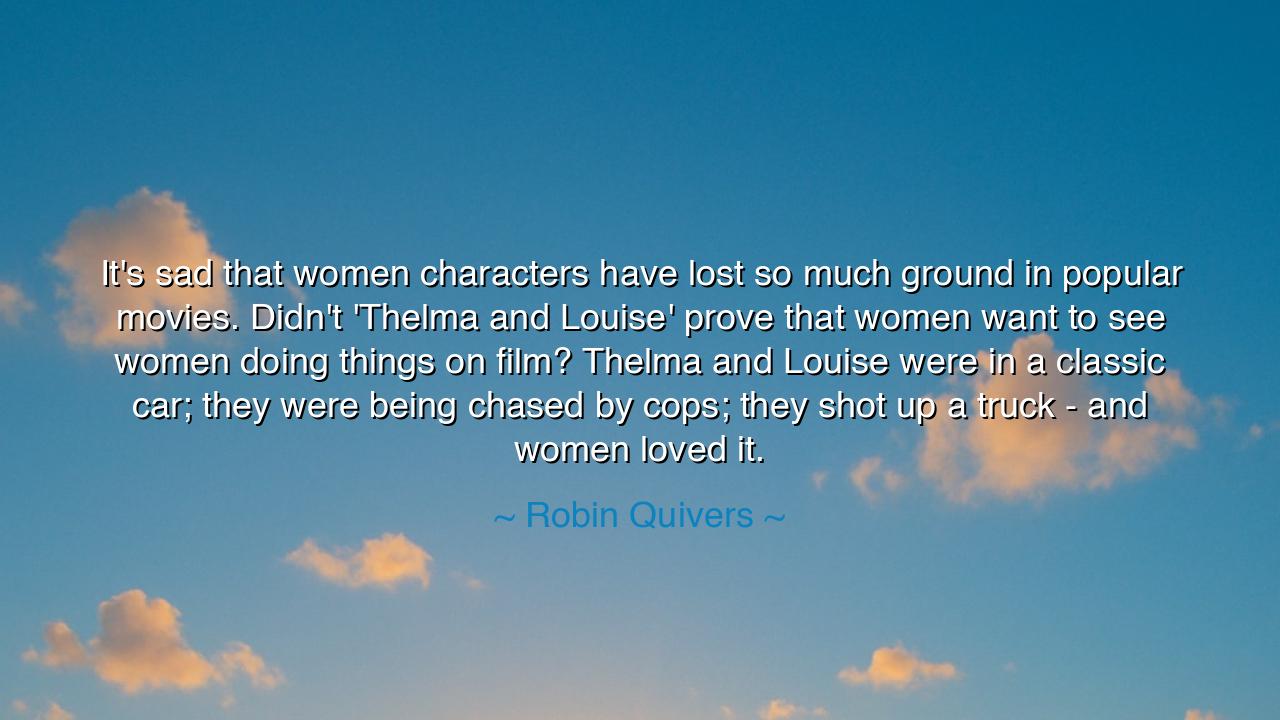
It's sad that women characters have lost so much ground in
It's sad that women characters have lost so much ground in popular movies. Didn't 'Thelma and Louise' prove that women want to see women doing things on film? Thelma and Louise were in a classic car; they were being chased by cops; they shot up a truck - and women loved it.






When Robin Quivers declared, “It’s sad that women characters have lost so much ground in popular movies. Didn’t Thelma and Louise prove that women want to see women doing things on film? Thelma and Louise were in a classic car; they were being chased by cops; they shot up a truck—and women loved it,” she was not merely lamenting a loss in cinema — she was issuing a cry for balance in the human story. Her words strike at the heart of a great cultural truth: that when the voices of women are silenced or diminished, the entire tapestry of art grows thinner, and the soul of storytelling loses its color. Quivers, herself a woman who rose within male-dominated spaces, understood that to see women act with courage, passion, and imperfection on screen is to remind all of us that power and humanity belong to every gender, not just one.
In the ancient world, women’s stories were often buried beneath the dust of patriarchy. Yet, even then, the goddesses and heroines shone through the cracks. Antigone, who defied a king for the sake of moral law; Cleopatra, who ruled empires with intellect and will; Boudicca, who led warriors against oppression — these women stood as eternal symbols of defiance and dignity. Quivers’ reference to Thelma and Louise is the modern echo of those same archetypes. The film’s wild, tragic beauty was not only about two women on the run — it was about two souls reclaiming their autonomy in a world that had long denied them power. Their rebellion was not against men, but against invisibility itself.
The sadness that Quivers expresses — that women characters have “lost ground” — speaks to a cultural regression. There was a time when cinema began to awaken to the power of the female voice: from Ripley in Alien to Sarah Connor in Terminator 2, from the courage of Erin Brockovich to the wit of Clueless, women were not confined to being adornments or sidekicks; they were agents of action, will, and change. But when those roles diminished, when women became mere reflections of male narratives again, it was not just women who lost — it was the audience’s capacity to dream fully. The decline of powerful women on screen mirrors a deeper imbalance in how society values their real-world voices.
Quivers’ invocation of Thelma and Louise is more than nostalgia; it is a challenge. That film’s resonance proved that audiences long to see women living boldly — not only in love, but in danger, in decision, in destiny. The chase, the defiance, the bullet fired into the sky — these were acts of spiritual reclamation. The film dared to portray women who were not perfect, not polite, not protected — and in their imperfection, they became real. In that realism lay their power. Women loved it, Quivers says — not because it flattered them, but because it told the truth: that women, too, long to live without permission.
This truth is ancient. When the poet Sappho wrote of desire, she was condemned for her voice; when Hypatia of Alexandria taught philosophy, she was silenced by mobs. Yet both left echoes that refused to die. So too, Quivers reminds us that every generation must fight again for the right of women to exist as full protagonists — not only in life but in art. The battle is not for domination, but for representation of the human soul in its wholeness. To erase the woman’s journey from our stories is to deny half of humanity’s wisdom.
From this understanding comes a lesson: art must not only entertain, but reflect the balance of the world as it should be. The storyteller, whether filmmaker or writer, must strive to illuminate both the feminine and masculine forces within creation. If one is silenced, the harmony collapses. Let every creator, every audience member, demand stories where women move, act, err, and triumph — for in doing so, they honor the sacred truth that courage and complexity know no gender.
Thus, let Quivers’ words echo as both lament and prophecy: “Women want to see women doing things.” The future of storytelling depends upon our willingness to heed that call. For when art once again gives women the freedom to drive their own narratives — to seize the wheel like Thelma and Louise and speed toward their fate, unafraid — then cinema, and humanity itself, will rediscover its fullness. And perhaps then, we will all remember: the liberation of one voice strengthens the song of all.






AAdministratorAdministrator
Welcome, honored guests. Please leave a comment, we will respond soon